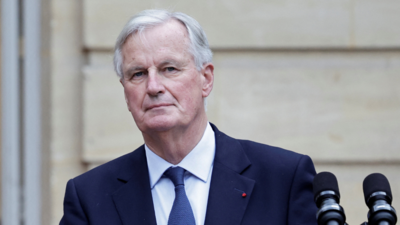
French Prime Minister Michel Barnier (Photo: Reuters)
Michel Barnier, France’s new prime minister, survived a
no-confidence motion
brought by the left-wing opposition on Tuesday, marking the first test for his fragile government in a divided
National Assembly
. The motion, proposed by the
New Popular Front
(NFP) coalition, fell well short of the 289 votes needed, with only197 lawmakers in support, as reported by AFP news agency.
A defeat for the left
The no-confidence vote, led by Socialist Party (PS) leader
Olivier Faure
, sought to remove Barnier's government, which President Emmanuel Macron appointed to restore stability after the inconclusive July elections. Faure admitted defeat, saying, "There was very little suspense," and acknowledged that the French public now had clarity on "who is in the majority and who is in the opposition."
Faure accused Barnier of being a "hostage and accomplice of the extreme right," referring to the
far-right National Rally
(RN) party, which voted against the motion, ensuring its failure. "It’s mathematical, without the support of the RN, your government would have been overthrown," said Cyrielle Chatelain, leader of the Ecologists party within the NFP. She further claimed the vote reflected "a political deal" between Macron and
Marine Le Pen
, leader of the RN.
Far-right opposition
Guillaume Bigot, an RN Member of Parliament, countered the left’s accusations, accusing the NFP of "sulking" and warning that bringing down the government would only "lead to chaos."
Barnier, a former European Union Brexit negotiator, was appointed in July to bring stability to a politically divided France. The 73-year-old veteran politician has since issued warnings about the nation’s financial health, cautioning that France faces a
financial crisis
if its budget deficit is not narrowed, and hinted at tax rises for high earners.
Instability
With Macron taking a back seat on domestic issues, Barnier could face further no-confidence motions that might succeed if the RN changes its stance. Commentators warn that Barnier’s government is now under a "sword of Damocles," vulnerable to the political whims of Le Pen, who is expected to run for the presidency in 2027.
Aware of the challenges ahead, Barnier said, "I know that I am in the hands of parliament," acknowledging that his administration’s survival rests on maintaining fragile alliances in a divided legislature.

 2 months ago
20
2 months ago
20









